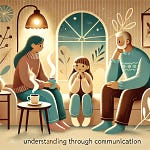Hello, everyone! Today, I want to share something personal that got me thinking about expectations and how they can shape our emotional well-being.
A few days ago, I called one of my close friends. As soon as she picked up the phone, she said, "I'm busy right now, I’ll talk to you later," and hung up. I thought, “No big deal, she must really be occupied. I'll wait for her to call back.”
Hours passed. Then a day. Then more than 24 hours. Still no callback. Not even a message.
Now, this is someone I consider a very good friend, so naturally, I started feeling upset. My mind went into overdrive, filled with questions and assumptions: Why is she doing this to me? Does it take that much time to send a quick text? I kept thinking, It would only take a second for her to let me know she's still busy.
At first, I brushed it off, convincing myself she must have had a really chaotic day. But as the hours turned into a full day and beyond, I realized how much emotional energy I was pouring into this. I was feeling low, on edge, and completely focused on when—not if—she’d call back.
In the back of my mind, I was telling myself, I’ll feel better once she calls me back.
The Power of Expectations
Expectations are funny things. Sometimes, we don’t realize how much we rely on them until they’re not met. I wasn’t just waiting for a callback—I was expecting one. That expectation slowly morphed into frustration and disappointment when nothing happened. It was as if I had handed over the remote control to my emotions and given my friend all the power to change how I felt.
This is the tricky part about expectations: they create unnecessary emotional baggage. We expect certain actions or behaviors from people, and when they don’t happen, we feel hurt, rejected, or even betrayed. The truth is, the more we let our emotions hinge on other people's actions, the less control we have over our own happiness.
A Shift in Perspective
As I sat with these emotions, I asked myself an important question: What if she really is overwhelmed and just doesn't have the emotional bandwidth right now? Instead of feeling upset, I shifted my thinking. I chose to practice empathy rather than resentment. Maybe she had a lot on her plate, or maybe something personal came up that was taking up all her attention.
More importantly, I realized I was allowing this situation to take up way too much space in my mind and heart. The truth is, we can't control other people’s actions or the timing of their responses, but we can control how we react to it.
Letting Go of the Need to Know
I realized that waiting for the call wasn’t solving anything, and it was only weighing me down. So, I decided to let go of my expectation. I sent her a quick text saying, “Hey, I hope you’re okay. I understand you’re busy. Let’s talk when you’re free.”
And you know what? I felt an immediate release of pressure. I was no longer waiting for her call to feel better. I had taken charge of my emotional state, and that felt empowering.
A Lesson in Mindfulness
This whole experience made me realize how much we tie our emotions to other people’s actions. In doing so, we lose sight of our own power. By practicing mindfulness and learning to let go of unnecessary expectations, we can prevent emotional turmoil and reclaim our inner peace.
So, the next time you find yourself waiting for a call, a text, or any form of acknowledgment—pause. Ask yourself if it’s worth the emotional energy you’re investing. Most likely, it’s not.
Funny Sign-off: So, next time someone leaves you hanging, don’t sit by the phone like a love-struck teenager from a 90s rom-com. Hang up the expectations and call yourself a good time! 😄📞
P.S.: I still haven’t heard back from my friend—but it’s okay! I've moved on to more pressing matters... like finishing that tub of ice cream in my freezer. 🍦














Share this post